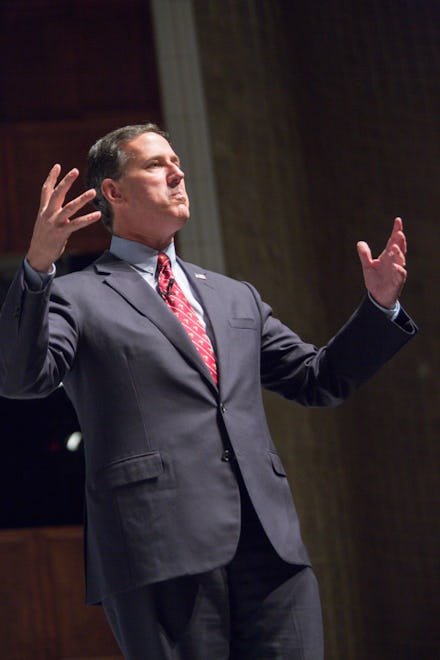Rick Santorum's Clash With Pope Francis on Climate Change Won't Be His Last

Republican Rick Santorum, the former senator from Pennsylvania and devout Catholic, enters this presidential primary season with a serious Pope Francis problem. The symptoms began to show on Monday, when WPHT radio host Dom Giordano asked the candidate about the pontiff's calls to action on climate change.
"The church has gotten it wrong a few times on science, and I think that we probably are better off leaving science to the scientists," Santorum, who is not a scientist, replied. "When we get involved with political and controversial scientific theories, then I think the church is probably not as forceful and credible."
Climate change, Santorum said, was like "agriculture policy and things like that, which are really outside the scope of what the Church's main message is."
By Wednesday morning, the Huffington Post had sharpened the exchange to simply, "Rick Santorum Wants Pope Francis To Stop Talking About Climate Change," while the Hill was even more direct in its headline: "Santorum: Pope Francis should stay out of climate change debate."
Santorum already needed a miracle to win the Republican nomination. But if he's looking to the Vatican, which under Pope Francis has emerged as a more moderate messenger on social issues, for divine intervention, his 2016 campaign might be in worse shape than the most recent polls indicate. A Washington Post/ABC News survey of GOP voters released Wednesday put him at 4%, good for a ninth place tie with Donald Trump.
Blame the Vatican: The irony here is that Santorum ran a pretty successful primary in 2012 by relentlessly appealing to Christian conservatives and Evangelical voters, particularly in the South. Bankrolled by billionaire pal Foster Friess, the early afterthought went on to win 11 states before finally giving way to the eventual nominee, Mitt Romney.
A little less than a year after Santorum conceded that GOP race, there was another notable ballot, contested under somewhat more private circumstances in Rome. After the final vote was cast, the white smoke rose from the Sistine Chapel and the world was introduced to Pope Francis I.
While Santorum is peddling pretty much the same brand (with an added dash of de rigeur economic populism) as he did three years ago, the Vatican of 2015 speaks a very different language from the days of the less popular, arch conservative Pope Benedict XVI. To the apparent delight of a great majority of Catholics, Francis has taken a notably softer line on hot-button social issues.
"We cannot insist only on issues related to abortion, gay marriage and the use of contraceptive methods," Francis told America magazine, a Jesuit weekly, in September 2013. "I have not spoken much about these things, and I was reprimanded for that. But when we speak about these issues, we have to talk about them in a context. The teaching of the church, for that matter, is clear and I am a son of the church, but it is not necessary to talk about these issues all the time."
Everyone loves Francis: Not coincidentally, the new pope has gone on to become one of the world's most esteemed figures. In March, Pew found that Francis had a 70% approval rating among all Americans. More importantly — for Santorum, at least — the pope registered an astounding 90% backing from U.S. Catholics. (Benedict bottomed out with just 61% approval in a Gallup poll testing the same cohort in 2010.)
One does not require a Ph.D. in presidential politics to understand the implications here for the candidate. His brand is religiosity, but he is increasingly casting himself in tension with the world's best known religious leader and one of its most celebrated human beings.
Fighting the old fight: Santorum is not known for embracing the current pope's more nuanced message, nor is his appeal staked to doing so. His brand of social conservatism is effective in the political realm precisely because it doesn't get bogged down in any kind of heady discourse. On Sunday, he vowed to continue the fight against marriage equality even after the Supreme Court rules, as expected, to legalize it later this month.
Asked in April if he would attend a loved one's same-sex wedding, Santorum told another conservative radio host, Hugh Hewitt, he would not, calling it "violation of my faith."
For Santorum, who also described himself this week as a "huge fan" of Francis, the papal policy gap could be a nuisance throughout the campaign. No candidate wants to be locked in opposition to most popular religious figure on the planet, but in Santorum's case, it could lead to an especially hard fall from grace.